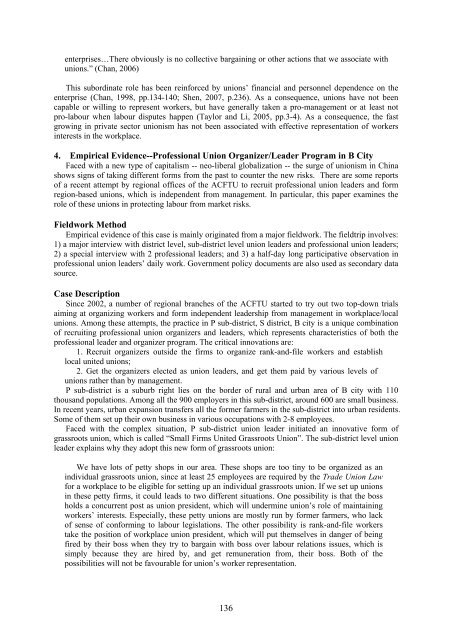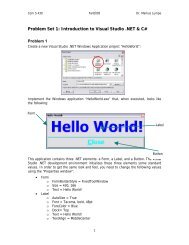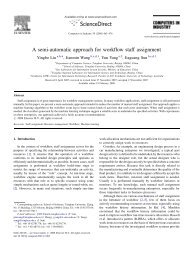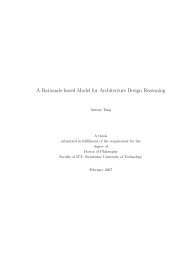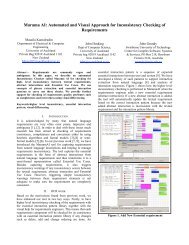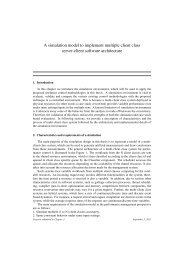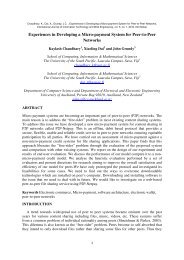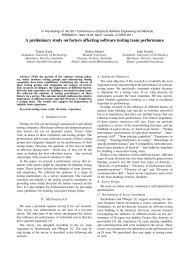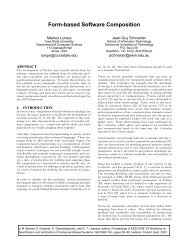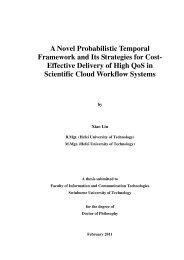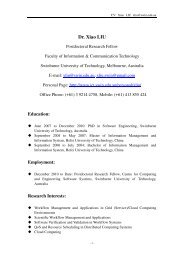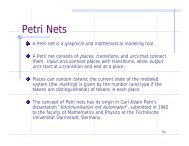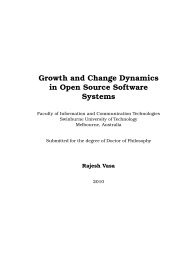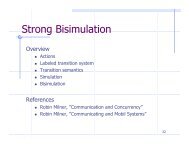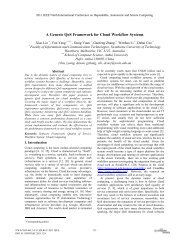Workshop proceeding - final.pdf - Faculty of Information and ...
Workshop proceeding - final.pdf - Faculty of Information and ...
Workshop proceeding - final.pdf - Faculty of Information and ...
Create successful ePaper yourself
Turn your PDF publications into a flip-book with our unique Google optimized e-Paper software.
enterprises…There obviously is no collective bargaining or other actions that we associate with<br />
unions.” (Chan, 2006)<br />
This subordinate role has been reinforced by unions’ financial <strong>and</strong> personnel dependence on the<br />
enterprise (Chan, 1998, pp.134-140; Shen, 2007, p.236). As a consequence, unions have not been<br />
capable or willing to represent workers, but have generally taken a pro-management or at least not<br />
pro-labour when labour disputes happen (Taylor <strong>and</strong> Li, 2005, pp.3-4). As a consequence, the fast<br />
growing in private sector unionism has not been associated with effective representation <strong>of</strong> workers<br />
interests in the workplace.<br />
4. Empirical Evidence--Pr<strong>of</strong>essional Union Organizer/Leader Program in B City<br />
Faced with a new type <strong>of</strong> capitalism -- neo-liberal globalization -- the surge <strong>of</strong> unionism in China<br />
shows signs <strong>of</strong> taking different forms from the past to counter the new risks. There are some reports<br />
<strong>of</strong> a recent attempt by regional <strong>of</strong>fices <strong>of</strong> the ACFTU to recruit pr<strong>of</strong>essional union leaders <strong>and</strong> form<br />
region-based unions, which is independent from management. In particular, this paper examines the<br />
role <strong>of</strong> these unions in protecting labour from market risks.<br />
Fieldwork Method<br />
Empirical evidence <strong>of</strong> this case is mainly originated from a major fieldwork. The fieldtrip involves:<br />
1) a major interview with district level, sub-district level union leaders <strong>and</strong> pr<strong>of</strong>essional union leaders;<br />
2) a special interview with 2 pr<strong>of</strong>essional leaders; <strong>and</strong> 3) a half-day long participative observation in<br />
pr<strong>of</strong>essional union leaders’ daily work. Government policy documents are also used as secondary data<br />
source.<br />
Case Description<br />
Since 2002, a number <strong>of</strong> regional branches <strong>of</strong> the ACFTU started to try out two top-down trials<br />
aiming at organizing workers <strong>and</strong> form independent leadership from management in workplace/local<br />
unions. Among these attempts, the practice in P sub-district, S district, B city is a unique combination<br />
<strong>of</strong> recruiting pr<strong>of</strong>essional union organizers <strong>and</strong> leaders, which represents characteristics <strong>of</strong> both the<br />
pr<strong>of</strong>essional leader <strong>and</strong> organizer program. The critical innovations are:<br />
1. Recruit organizers outside the firms to organize rank-<strong>and</strong>-file workers <strong>and</strong> establish<br />
local united unions;<br />
2. Get the organizers elected as union leaders, <strong>and</strong> get them paid by various levels <strong>of</strong><br />
unions rather than by management.<br />
P sub-district is a suburb right lies on the border <strong>of</strong> rural <strong>and</strong> urban area <strong>of</strong> B city with 110<br />
thous<strong>and</strong> populations. Among all the 900 employers in this sub-district, around 600 are small business.<br />
In recent years, urban expansion transfers all the former farmers in the sub-district into urban residents.<br />
Some <strong>of</strong> them set up their own business in various occupations with 2-8 employees.<br />
Faced with the complex situation, P sub-district union leader initiated an innovative form <strong>of</strong><br />
grassroots union, which is called “Small Firms United Grassroots Union”. The sub-district level union<br />
leader explains why they adopt this new form <strong>of</strong> grassroots union:<br />
We have lots <strong>of</strong> petty shops in our area. These shops are too tiny to be organized as an<br />
individual grassroots union, since at least 25 employees are required by the Trade Union Law<br />
for a workplace to be eligible for setting up an individual grassroots union. If we set up unions<br />
in these petty firms, it could leads to two different situations. One possibility is that the boss<br />
holds a concurrent post as union president, which will undermine union’s role <strong>of</strong> maintaining<br />
workers’ interests. Especially, these petty unions are mostly run by former farmers, who lack<br />
<strong>of</strong> sense <strong>of</strong> conforming to labour legislations. The other possibility is rank-<strong>and</strong>-file workers<br />
take the position <strong>of</strong> workplace union president, which will put themselves in danger <strong>of</strong> being<br />
fired by their boss when they try to bargain with boss over labour relations issues, which is<br />
simply because they are hired by, <strong>and</strong> get remuneration from, their boss. Both <strong>of</strong> the<br />
possibilities will not be favourable for union’s worker representation.<br />
136


